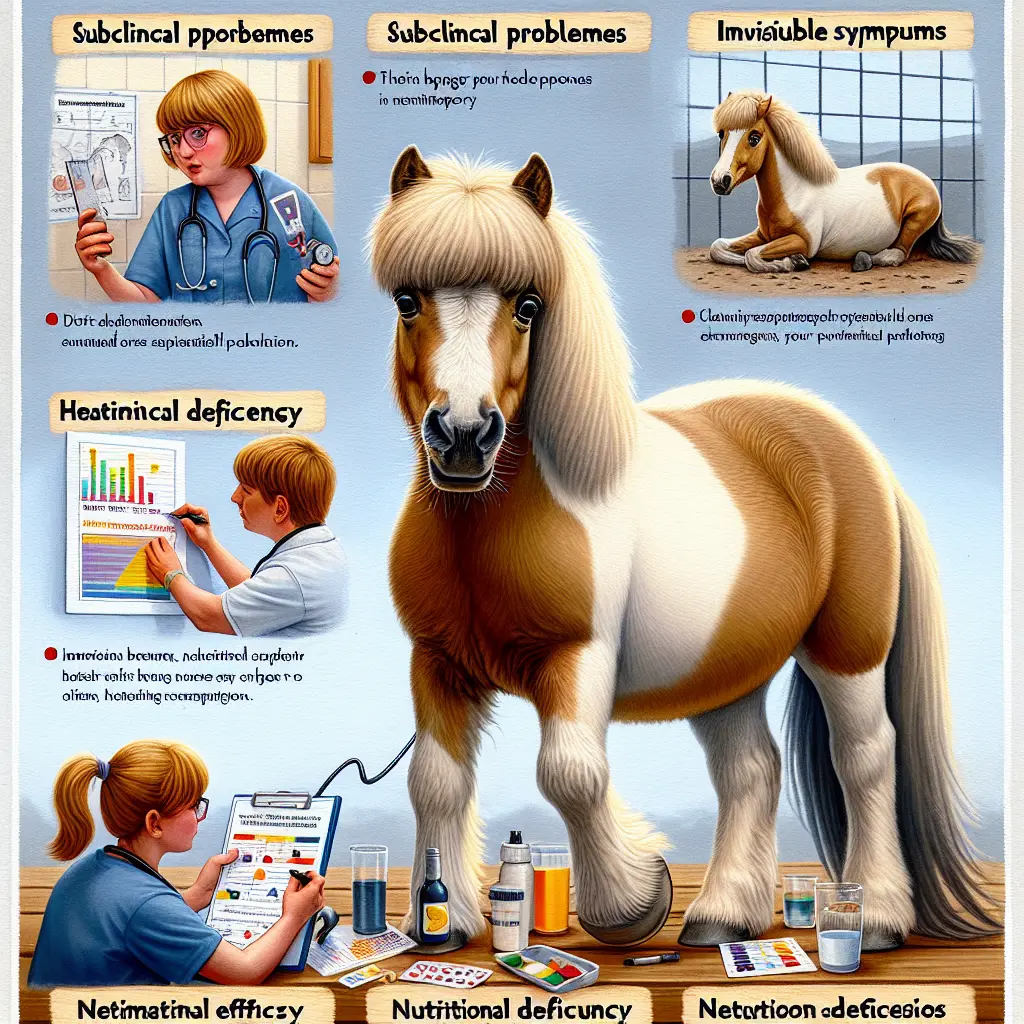Investigating Causes and Solutions for a Pony's Sudden Low Energy Levels
When your beloved pony suddenly seems more interested in napping than prancing, it can be quite the head-scratcher. A pony showing low energy levels is usually a sign of an issue that needs addressing. Before you decide that your pony’s spirit animal is a sloth, let’s delve into the common causes and solutions to restore their pep.
Common Causes of Low Energy in Ponies
Poor Conformation or Physical Issues
Reason: Your pony’s unique physique might be compromising their energy. Unfavorable conformation can hinder their ability to comfortably perform their daily agenda.
Solution: Assess your pony's build and if their workload is realistic. Consider a session with a vet or equine therapist to rejig their schedule for optimum comfort. Your pony prefers easy breezy, not cramped and hampered!
Subclinical Problems
Reason: Just because your pony isn’t sporting a neon sign saying, “I’m not well!”, doesn’t mean they’re peachy. Issues like stomach ulcers or mild asthma might be stealthily impacting their energy levels [source].
Solution: It's vet time! Book a thorough check-up with blood tests and perhaps a gastroscopy. These exams are their magic wands to chase away invisible ailments.
Abnormalities in Energy Metabolism
Reason: With Equine Metabolic Syndrome (EMS) and Polysaccharide Storage Myopathy (PSSM) lurking around, energy metabolism doesn't stand a chance. These conditions can be the ultimate energy thieves [source].
Solution: Tailor your pony’s diet and workout plan like a personal trainer. Veterinarians and certified equine nutritionists are likely to decorate their walls with gratitude plaques from you!
Anemia
Reason: Just like humans, ponies can be affected by anemia, leading to low energies. This condition can significantly reduce oxygen supply, resulting in potential laziness [source].
Solution: Bloodwork can confirm anemia. Get to the bottom of it faster than you can say “red blood cells” and address potential causes like parasite infestations or chronic disease.
Stress and Environmental Changes
Reason: Major life shifts can leave your pony feeling more than a little blue. Adjustments in environment, social settings, or feeding can ruffle their feathers—or should we say mane?
Solution: Consistent routines and stability can turn those forlorn whinnies into happy neighs.
Nutritional Deficiencies
Reason: A diet lacking essential nutrients can have your pony kissing energy goodbye. Important players like sodium, vitamin E, and selenium shouldn’t be sidelined [source].
Solution: Think of a balanced diet as a finely tuned symphony. For fine-tuning, enlist a specialist. After all, every pony is a rock star in its own right.
Exhaustion and Overwork
Reason: Too much of a good thing can turn back and bite you, and the same applies to excessive exercise [source].
Solution: Keep the routine alternating between invigorating adventures and serene rest days—it’s less about finding balance and more of maintaining harmony.
Practical Solutions to Enhance Energy Levels
Adjust Diet and Nutrition
Boosting your pony's energy levels starts with a well-balanced diet. For the hardworking ponies, consider a diet higher in fats to provide sustained energy [source].
Maintain Regular Veterinary Check-Ups
Early detection can prevent those nasty alien invasions of lethargy.
Provide Adequate Exercise
Quite honestly, it’s about customizing the workout to fit them like a glove— not too tight, and definitely nothing too oversized.
Reduce Stress
If “zen” had to be encapsulated, allow your pony to be the muse. A calm environment with enough social interaction is key.
Conclusion
Catching the signs early and applying the right solutions can return that bounding energy your pony once showcased. It’s all about finding the right balance in diet, routine, and care. Now, if only they could keep that energy for carrot-fetching, eh?
For those eager to delve deeper, discover premium pony products including our Jodhpur Collection, Stable Rugs, and Horse Fly Protection that promise ultimate comfort and energy retention.






